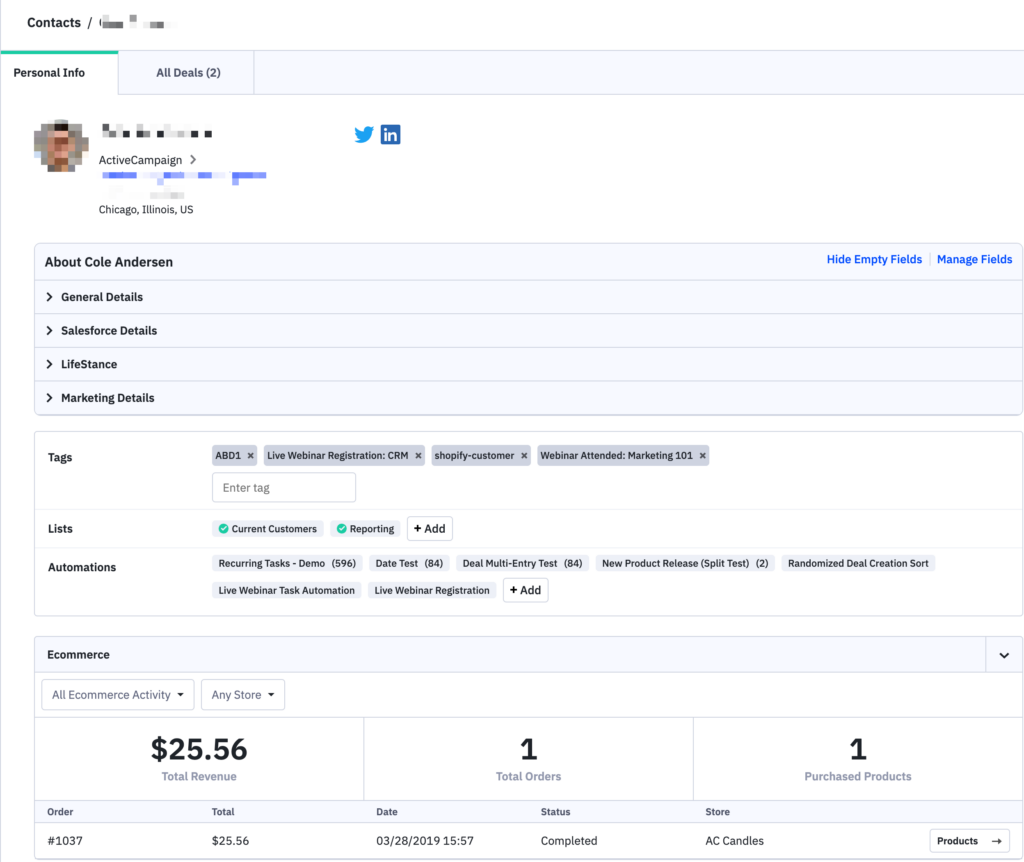Introduction
With your ActiveCampaign account you can directly connect with Shopify, BigCommerce, WooCommerce, Square, and Magento at a deeper level than ever.
What does that mean for your business? What is deep data anyway? This guide will answer those questions and more.
Defining Deep Data
There are three main differences that separate our five Deep Data Integrations from all others in the industry:
1. They retrieve much more data than the basic information that standard integrations pull.
2. They automatically provide data-specific structure.
3. They empower you to easily act on crucial data efficiently.
Let’s look at each of those points more closely.
Beyond Basic
As their name suggests, Deep Data Integrations dig a little deeper. Most integrations communicate only basic information to our platform. Such data includes name, email, and birthday. With Deep Data Integrations for ecommerce tools, ActiveCampaign automatically retrieves valuable data that it could not previously reach.
Among other things, our platform records each of your customers’ total number of orders. It tracks the total revenue each customer generates for your business, and it monitors the total number of products customers buy. Essentially, the Deep Data Integrations help you know your customers more intimately.
Data-Specific Structure
Before these Deep Data Integrations, users would have to create custom fields or tags to represent ecommerce data. Now, these integrations automatically generate and fill fields for you and intuitively place the fields in an ecommerce section on each contact record.

As shown in the above image, the Deep Data Integrations provide an appropriate structure for the data. They allow ActiveCampaign to recognize data as ecommerce data and enable our platform to organize that data accordingly. The ecommerce section appears only to users who have the Deep Data Integrations connected. Otherwise, any custom fields that users create to reflect such data are lumped together in the “Info” section.
Note: If you created a custom field with the same name as a field that a Deep Data Integration automatically creates, then two fields will exist, one in the “Info” section and the other in the new “Ecommerce” section. Custom fields created by a Deep Data Integration are separate from user-created fields, and the integration automatically fills the data in them, not the ActiveCampaign user. You would no longer need to maintain the field you created; ActiveCampaign will store that data for you.
Actionable Data
What good would this new data be to you if you could not act on it?
The most impactful perk of Deep Data Integrations is that they allow you to access ecommerce information right in the segment builder. You use the segment builder — which can be found throughout the platform — to segment contacts and craft targeted marketing. Having such data at your fingertips empowers you to send more relevant messages, which edges you closer to accomplishing your ultimate business goals.
Indeed, much of what we develop is meant to aid you in segmentation and targeted marketing.
What It Means For You
As we wrote in our Shopify announcement, Deep Data Integrations mean that “stacking becomes virtually the same as having third-party apps built right into ActiveCampaign.”
Stacking has strength, and Deep Data Integrations will help you round out the most versatile marketing stack possible. Thanks to Deep Data Integrations, valuable ecommerce data is automatically recorded and organized. You no longer need to manually create and assign such data to tags and custom fields.
In short, Deep Data Integrations make your marketing more powerful and your job easier.
You can access data categories in the segment builder and plan the messages contacts receive according to their behavior on Shopify, BigCommerce, WooCommerce, Square and Magento.
Note: Contacts are not automatically added to your lists just because they have a history of ecommerce data. Also, you should know that Deep Data Integrations does not currently map billing data; you can access that information in your Shopify, BigCommerce, WooCommerce, Square, or Magento account.
Starting Automations With Deep Data Integrations
The “Makes a purchase” start trigger goes hand-in-hand with the Deep Data Integrations. It tells ActiveCampaign to automatically add contacts to automations immediately after they purchase from your ecommerce store.
You can access the “Makes a purchase” start trigger in the same place you do the others. The trigger appears there as soon as you connect a Deep Data Integration to your account (see the next section for more on that).
The criteria for the start trigger is broad; it grants automation access to all contacts who make a purchase. But, you can use the segment builder in automations to further segment contacts, as we mentioned in the previous section.
How To Find And Connect The Integrations
Can’t wait to integrate? Let’s discuss how you can do so.
To find and connect Deep Data Integrations to your ActiveCampaign account, you first must visit your “Settings” page.
Then, click “Integrations” at the bottom of the left-side menu. Doing so loads the “Connected Integrations” page, where you can view all of your integrations. You can also add new ones by clicking “Add integration” in the top right corner.
Follow the steps for your store type:
Once you have connected your store, any ecommerce actions your contacts take on your shop is seamlessly transmitted to ActiveCampaign in real-time.
Additionally, you can retrieve the entire history of your contacts’ interaction with your ecommerce site. To add such data, simply click on the “Manage” button and then the “Run Historical Sync” Button.
You now have a wealth of ecommerce data to act on.
Note: Disconnecting your integrations, which you can do by clicking the red “Disconnect” button shown in the above screen recording, does not delete any data that was added to your contacts’ records. However, future data will not be recorded if you disconnect.
Closing Remarks
Ultimately, Deep Data Integrations enhance contact-specific engagement, which you can effortlessly execute via automations.
Feel free to submit your ideas to us here. We rely on your voices to know what features can make ActiveCampaign better for all who use it.



